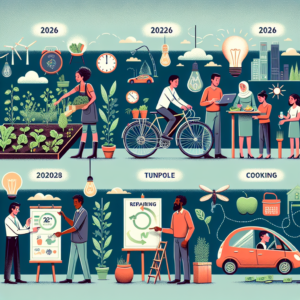How AI is Transforming Personal Finance Management in 2025

How AI is Transforming Personal Finance Management in 2025
The world of personal finance is experiencing a revolution in 2025, driven by rapid advancements in artificial intelligence (AI). What was once the realm of spreadsheets, calculators, and hours of manual budgeting has become seamlessly automated, more personalized, and far more accessible for people of all financial backgrounds. In this article, we explore the key ways AI is transforming personal finance management, making smarter money decisions possible for everyone.
1. Hyper-Personalized Financial Guidance
AI-powered personal finance apps now act as intelligent advisors, providing recommendations tailored to each individual’s unique circumstances. By securely analyzing a user’s transaction history, income streams, spending habits, and long-term goals, these platforms generate real-time advice on budgeting, saving, and investing.
Imagine an app that knows when your rent is due, what your average utility bills look like, and whether you’re hitting your savings target for an upcoming vacation. It can nudge you to set aside more money weeks before a big expense, or suggest a way to trim non-essential spending without sacrificing enjoyment. Thanks to advances in machine learning and natural language processing, AI assistants even provide explanations in plain language, making complex financial concepts easy to grasp.
2. Smart Automation of Money Management
No longer do users need to juggle multiple apps, alert calendars, or remember due dates. AI organizes and executes routine tasks: paying bills, transferring funds into savings or investment accounts, and allocating portions of paychecks into different “buckets” based on personalized priorities. These actions are not static rules, but are dynamically adjusted in response to life changes, market conditions, or unexpected events.
For example, if a large, unplanned expense arrives (such as a medical bill), an AI-powered assistant can propose a revised budget, delay a non-urgent purchase, or adjust investments to keep you on track with your goals. AI-driven automation reduces the mental load of money management, all while minimizing the risk of late fees or missed opportunities.
3. Real-Time Fraud Detection and Financial Security
Security is paramount in financial management, and AI’s capabilities in detecting fraud have become more sophisticated in 2025. By continuously learning from millions of transaction patterns, AI systems can instantly flag suspicious activity—such as duplicate transactions, unusual account access, or anomalous spending outside normal habits.
In many cases, AI detects threats and takes preventative action faster than human-controlled systems ever could. Users are promptly notified through their preferred channels, provided with actionable steps, and protected from the potential fallout of cybercrime. This shift provides users with peace of mind, knowing that AI is vigilantly monitoring their accounts 24/7.
4. Smarter Investing for All
The benefits of AI in wealth management, once reserved for affluent clients, are now accessible to the masses. Robo-advisors leverage AI to craft diversified portfolios based on users’ risk tolerances, time horizons, and preferences. These platforms automatically rebalance portfolios, harvest tax losses, and respond to real-time market changes—often with lower fees and better performance than traditional solutions.
AI also democratizes access to advanced investment strategies by breaking down barriers of entry. Beginners receive education and simple explanations of terminology, while experienced investors benefit from predictive analytics and scenario modeling, allowing more informed and confident decisions.
5. Proactive Debt and Credit Management
Managing debt is another area revolutionized by AI. Intelligent platforms analyze all outstanding loans, credit cards, and payment obligations, then recommend optimal strategies to minimize interest and maximize credit score improvements. Whether it’s identifying opportunities to consolidate debts, refinance at a lower rate, or simply structure payments for the most impactful results, AI turns what was once a maze of confusion into a clear, guided path forward.
For those working to build or repair their credit, AI keeps tabs on key metrics, alerts users whenever action is needed, and even negotiates on their behalf using intelligent chatbots, taking much of the stress and uncertainty out of the process.
6. Financial Wellbeing and Behavioral Change
Beyond numbers and transactions, AI-powered tools now focus on holistic financial wellbeing. By drawing on principles from behavioral psychology, these apps help users set healthy financial habits, overcome emotional spending, and create sustainable routines that align with their values. Personalized nudges, motivational insights, and goal-tracking are delivered at exactly the right moments, fostering healthier financial outcomes over the long term.
What’s Next? The Future of AI and Personal Finance
2025 is just the beginning. As AI systems become even more powerful through advances in privacy-preserving techniques and the integration of global financial data, personal finance will get smarter, safer, and more user-centric. Financial literacy gaps are closing, emerging markets are accessing sophisticated tools for the first time, and everyone has the potential to take greater control of their economic destiny.
In summary, artificial intelligence is rewriting the playbook for personal finance. Its influence empowers individuals to make wiser decisions, avoid pitfalls, achieve their ambitions, and enjoy a healthier relationship with money than ever before. The era of truly smart finance management has arrived—and it’s only getting better.
* The post is written by AI and may contain inaccuracies.





